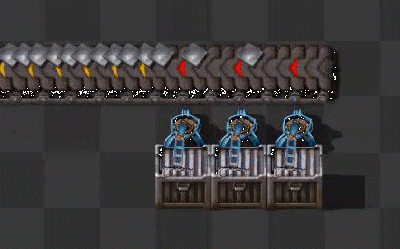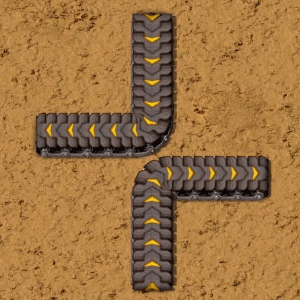Transport belt: Difference between revisions
Jump to navigation
Jump to search
m sentence tweak |
m →History: removed entry not relevant to this tier of belt |
||
| Line 56: | Line 56: | ||
* Items marked for deconstruction cannot be moved by belts anymore. | * Items marked for deconstruction cannot be moved by belts anymore. | ||
* Reduced the CPU load caused by big counts of [[inserters]] loading/unloading transport belts.}} | * Reduced the CPU load caused by big counts of [[inserters]] loading/unloading transport belts.}} | ||
{{history|0.9.7| | {{history|0.9.7| | ||
Revision as of 10:12, 13 March 2018
| Transport belt |
- Base game
- Space Age mod
Object description
Transport belts are the easiest and cheapest method of automatic item transportation. They are the first tier among the three transport belts.
No prior research is required and they are available from the beginning of the game.
Properties

| Type | Max. throughput (Items per game-second)1 | Speed (Tiles per game-second)1 | Max. density (Items per tile)1 | Required technologies |
|---|---|---|---|---|
| Transport belt | 13.33 | 1.875 | 7.111 | none |
(1) See Physics of Transport Belts for more detailed information.
Production Layouts
Iron gear wheels take the same amount of time to manufacture as transport belts, so one gear assembler can supply one belt assembler at full capacity, provided they are the same tier. An example is shown below.
| Design | Input: (Items per game-second) |
|---|---|
| File:Transport belt layout1.jpg | |
| Output: (Items per game-second) | |
History
- 0.15.0:
- Increased stack size from 50 to 100.
- 0.13.0:
- Transport belt is now connectible to the circuit network.
- Transport belt connectible entities will now disconnect from incoming belts when marked for deconstruction.
- 0.12.0:
- Items on transport belts don't go off the belt at the end, so the transport belt has to go directly in front of the required inserter.
- Optimised the transport belt movement.
- 0.11.9:
- Items marked for deconstruction cannot be moved by belts anymore.
- Reduced the CPU load caused by big counts of inserters loading/unloading transport belts.
- 0.9.7:
- Belts to be deconstructed no longer accept items.
- 0.9.6:
- New transport belt graphics.
- 0.9.0:
- Small optimisation.
- 0.7.1:
- Express transport belt now takes 15 Iron gear wheels to craft.
- 0.6.0:
- Transport belt doesn't pull player out of the edge of it (like items), so player won't be almost trapped on faster transport belts.
- 0.5.0:
- Better movement on transport belts in turns and crossings.
- 0.2.8:
- Cross connections of transport belt of the same type are disabled.
- 0.2.2:
- When transport belts are rotated (or replaced with different than opposite direction), items on transport belt are collected.
- 0.2.1:
- Small optimisation.
- 0.1.0:
- Introduced
